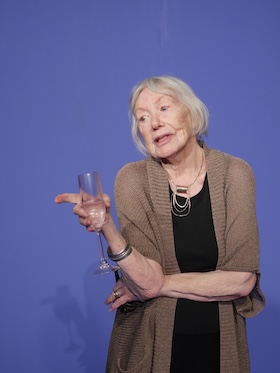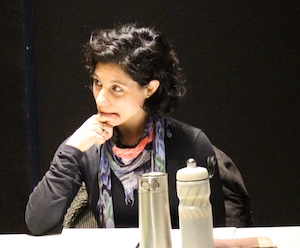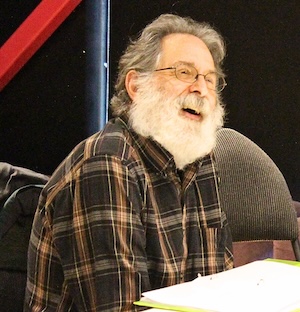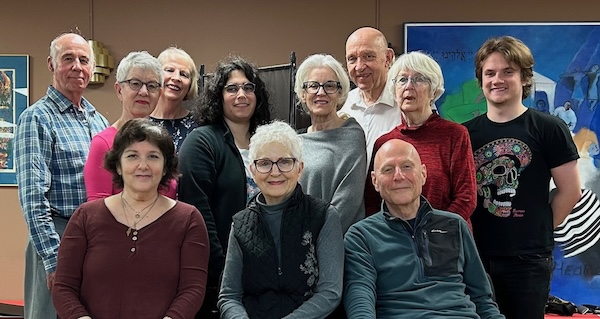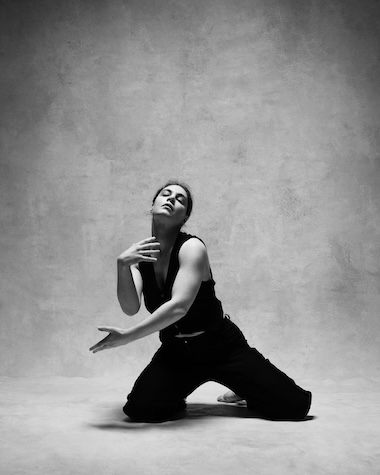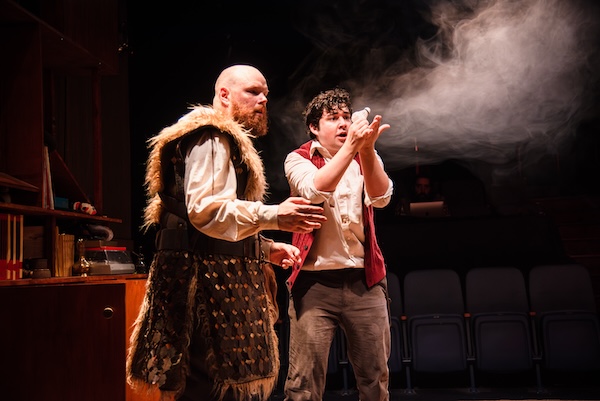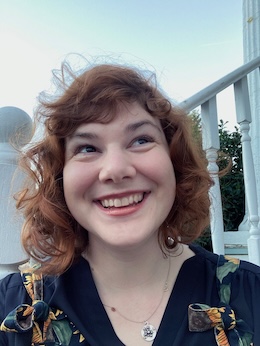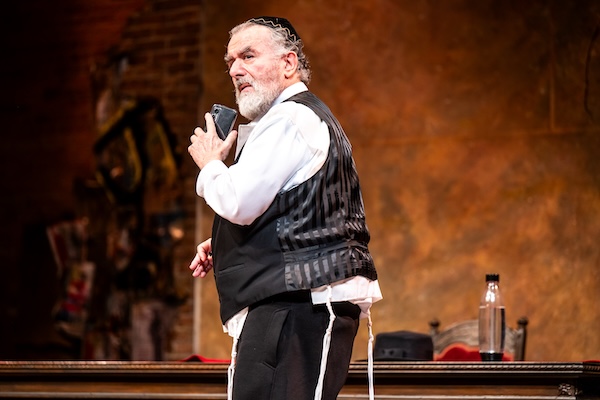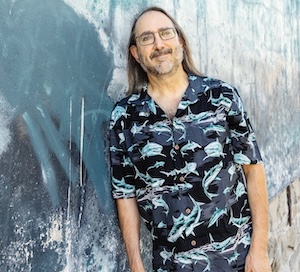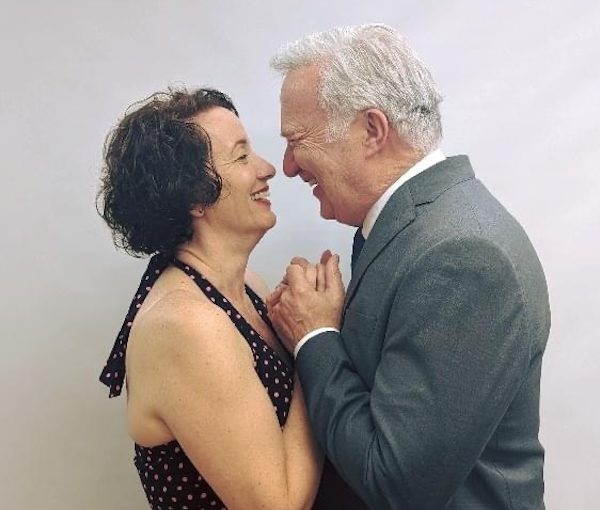Lorin Sklamberg, left, Sasha Lurje and Craig Judelman close the 10-day festival of comedy, music, theatre, dance and storytelling on Nov. 23 with Yiddish Songs of Social Change. (photo from Chutzpah! Festival)
The Chutzpah! Festival returns for its 25th anniversary with a mix of festival favourites and new discoveries in a lineup of performances Nov. 12-23, showcasing music, theatre, comedy, dance and storytelling through a multicultural Jewish lens.
“This Chutzpah! Festival is one of collaboration and celebration, combining past artistic managing director Jessica Gutteridge’s vision and my own,” said the festival’s new artistic managing director, Shayna Goldberg. “Chutzpah!’s legacy over the last 25 years has been to share diverse work from a multitude of Jewish perspectives, and the offerings this year are just as thrilling and exciting as any other. For 10 days this November, come and experience the best of what Canadian and international artists have to offer.”

The festival opens Nov. 12, 8 p.m., at the Vogue Theatre with Modi Rosenfeld, presented in partnership with MRG Live. The Israeli-American comedian brings his Pause for Laughter Tour here for the festival.
Erik Angel, also an Israeli-American comedian, brings his project Comedy for Peace to Chutzpah! on Nov. 22, 7:30 p.m., at the Rothstein Theatre. Aimed at uniting communities through humour and mutual understanding, Comedy for Peace brings together stand-up comedians – Jewish, Christian, Muslim – for a show of “no politics. just laughs.” Joining Angel will be Ashley Austin Morris, Natan Badalov and Zara Khan. (See jewishindependent.ca/comedy-can-unite-and-heal.)
Chutzpah presents the West Coast debut of 8 Gays of Channukah: The Musical (Canada) at the Rothstein Theatre Nov. 13, 7:30 p.m. Blending Broadway-style musical numbers with comedy, drag artistry and Jewish joy, eight stories are brought to life by show creators Gila Münster, Sarah Freia and Yan Simon. The show includes an opening act by a local artist and there will be an 8 Gays of Channukah Shuk, featuring the work of local artisans, where you can pick up some gifts for the holidays.
Lea Kalisch’s Shtetl Cabaret (Switzerland/United States/Canada) is a night of collaborations featuring Tobias Moss and local Vancouver artists including Mike Braverman and Jason Overy. This show, which takes place Nov. 19, 7:30 p.m., at the Beaumont Studios (19+ venue), presents Jewish music, from forgotten melodies to original songs, and mashups from rap to rumba and folk to feminism.
Yiddish Songs of Social Change (United States/Germany/Latvia), presented by the Golden Thread Septet, explores Yiddish music as a tool for and reflection of social change, and features Lorin Sklamberg and Sasha Lurje, with arrangements by Craig Judelman. Judelman has arranged the Yiddish and English songs in a style that reflects the context of the songs themselves and honours the centuries-old tradition of using all these influences to inform the creation of new Yiddish music. In addition to the performance on Nov. 23, 7:30 p.m., at the Rothstein, Sklamberg, Lurje and Judelman will lead a free workshop about Yiddish music and dance that same day, at 2 p.m. Come explore both traditional and contemporary versions of Yiddish music and learn how you can dance along.
Back by popular demand, Chutzpah! and Vancouver Opera present Ne. Sans Opera & Dance’s Take This Waltz: Celebrating the Music of Leonard Cohen (Canada/Israel). This operatic and contemporary dance performance inspired by Canadian singer-songwriter Leonard Cohen was originally presented in 2022 as a Chutzpah! Plus event. Created by local choreographer Idan Cohen and bass-baritone Daniel Okulitch, it features Okulitch alongside dancer/musician Ted Littlemore and a virtuoso live ensemble of strings and accordion. Take This Waltz is at the Rothstein Theatre Nov. 15 and 16, 7:30 p.m. (See jewishindependent.ca/celebrating-leonard-cohen.)
On Nov. 20, 7:30 p.m., at the Rothstein Theatre, Chutzpah! presents the North American premiere of Common Place (Australia/Israel) by power-duo dancer/choreographer Omer Backley-Astrachan and multiple-award-winning dancer Jana Castillo. Common Place is a physical exploration of belonging and togetherness, delving into shared action, collaboration and synchronization.
Deb Williams returns to Chutzpah! with the Flame, an evening of storytelling, on Nov. 17, 7:30 p.m., at the Rothstein Theatre. The Flame is a grassroots series where real people share their personal, true stories in front of an audience under Williams’s direction. This edition will feature a multicultural group including Karen Segal, Dhana Musil and others. Williams will also host an in-depth weekend workshop prior to the event (Nov. 15 and 16, at the Post at 750) to help storytellers hone their craft.
On Nov. 18, 7:30 p.m., at the Rothstein, Chutzpah! presents I’m Not a Comedian … I’m Lenny Bruce (United States), a one-man show exploring the life and battles of one of the most groundbreaking comedians of all time, Lenny Bruce. Created and performed by Ronnie Marmo and directed by Tony Award-winner Joe Mantegna, this show threads Bruce’s original comedic bits with insights from his writings.
Other workshops and talkbacks with festival artists, facilitated by members of the Vancouver arts community, will run throughout the festival. Visit the festival website for updates and registration information.
Most single tickets for Chutzpah!’s live performances are offered at a pay-what-you-will price, with the levels at $18, $36, $52 and $70 (+ gst/sc). I’m Not a Comedian … I’m Lenny Bruce is $40 (students/seniors), $54 (general) and $72 (VIP) (+gst/sc). ChutzPacks are also available, for $136: see four different regular-price shows of your choice. Tickets for Modi can be purchased through admitone.com/events. For tickets to any of the performances and more information about any of the events, visit chutzpahfestival.com or call 604-257-5145.
– Courtesy Chutzpah! Festival



